Introducing five new baby Humboldt penguin chicks – the first penguin chicks to hatch at the zoo since 2021!
Introducing Mozzarella, Camembert, Cheddar, Halloumi and Gorgonzola… Nope, we haven’t gone into the cheese making business – but it’s the naming theme for this seasons Humboldt penguin chicks!
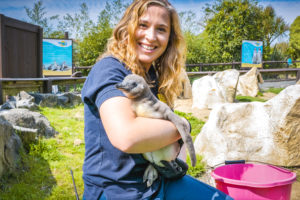
Mozzarella with keeper Catrin
After a quieter few years on the breeding front, our wonderful keepers were in the position to start breeding our Humboldt penguins again this season, as part of the managed European Breeding Programme for the species through our membership with the European Association of Zoos and Aquariums (EAZA). These are the first penguin chicks to arrive on the zoo for three years!
[InsertVideo video=https://www.youtube.com/embed/o27uhhzgcdM?si=oU8uk3eOzu4NrFO6]
Humboldt penguins are sadly classed as a vulnerable species and threats to them in the wild are numerous. Habitat loss, pollution, climate change and reduced food availability due to commercial fishing are the main issues. Breeding programmes allow zoo and animal collections to safely and responsibly ensure the populations of vulnerable animals like these are protected.
Penguin breeding had been on hold up until now, as a result of the penguin enclosure being at full capacity after rehoming a colony of Macaroni penguins in 2021 after a fellow EAZA zoo closed due to the financial effects of the pandemic. Also post-pandemic, there were restrictions on movements of animals in and out of Europe which has now eased – and we couldn’t be more delighted to breed again!
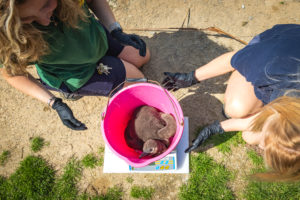
Camembert getting weighed – penguin chicks can double in weight every couple of days!
The adorable new penguin chicks are growing so quickly – and are currently cosy in their nest boxes being cared for by both parents who take it in turns feeding whilst the other goes for a swim in the pool. They can double or even triple in weight every couple of days! In a few weeks they will leave their comfy nests and be taken by our experienced keepers into our penguin nursery facility, where they’ll spend a few weeks learning to feed on whole fish and swim in the small ‘baby pool’, before graduating to the main pool again with the rest of the colony.
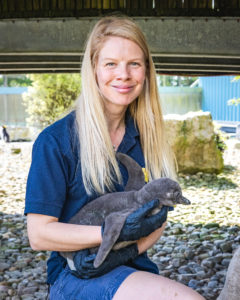
Caz with our third arrival, Cheddar
[Pullout] “We’re so excited to have chicks again. Each breeding season, keepers choose a catchy naming theme to easily identify the birds – and over the many successful breeding seasons we’ve had an array of fun themes. From ice lollies and scientists, to Simpsons characters and presidents. Penguin chicks can’t be sexed until they’re a bit older and feather samples can be taken from them so we’ll just have to wait on a gender reveal for now!” – Caz Davies, Penguin Keeper [/Pullout]
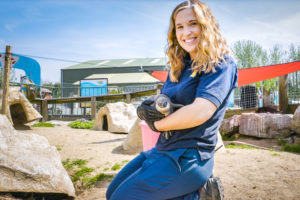
Catrin holds Halloumi, our fourth chick
Mozzarella was the first to arrive on the 30 March to parents ‘Magnum’ and ‘Feast’, followed by Camembert on 02 April whose parents are ‘Perci’ and ‘Puffy’. Cheddar arrived soon after on 05 May to ‘Whippy’ and ‘Pippy’ and Halloumi hatched on 10 May to first time parents ‘Einstein’ and ‘Darwin’. Gorgonzola is the youngest chick and hatched on 14 May to ‘Popple’ and ‘Pudding’.
Penguin Coast is currently home to 22 Humboldt and 14 Macaroni penguins. Guests won’t be able to see the newest arrivals quite yet – but watch this space for lots of pics and updates, as well as news on their graduation into the main pool!
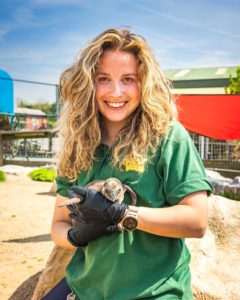
Last but not least, our youngest chick Gorgonzola, along with keeper Becky